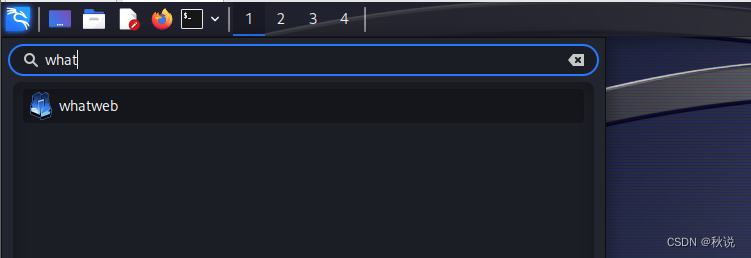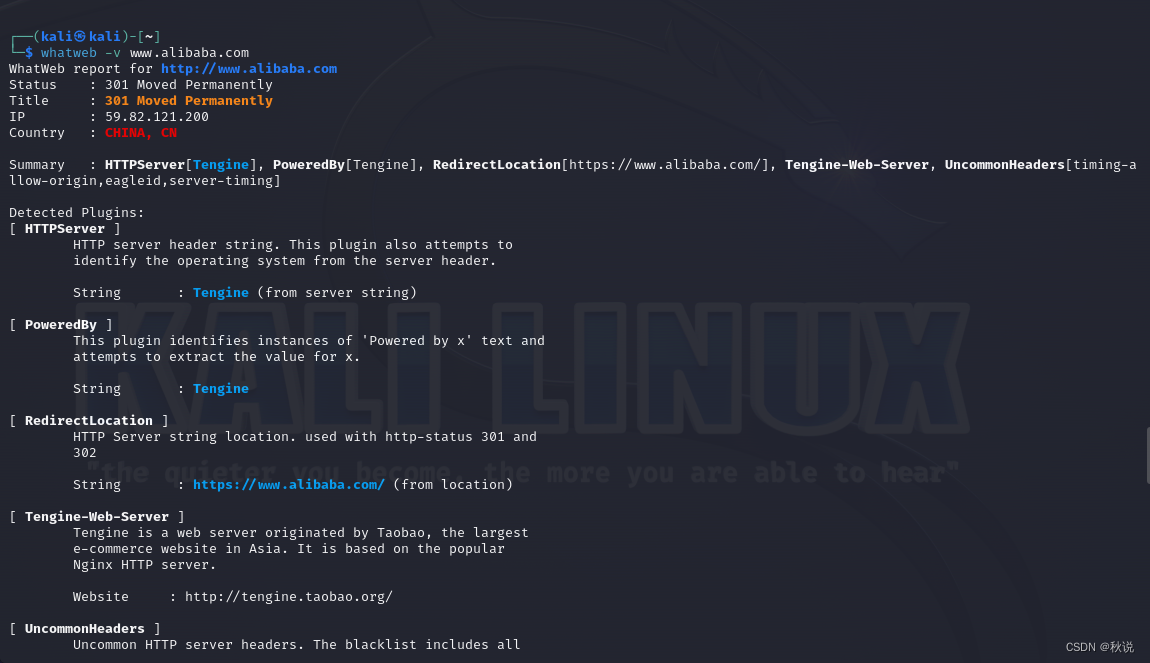Preface
WhatWeb is an open source tool for identifying Web applications and Web servers. It can identify the programming language, Web framework, Web server software, Web applications and other information used by the website, thereby helping security testers quickly understand the technical characteristics of the target website and discover possible vulnerabilities.
This article will explain how to use WhatWeb
Article directory
text
The Kali virtual machine comes with the whatweb tool, which does not need to be installed and can be used directly.

Scan website fingerprints
- Enter the whatweb command in the terminal or command line, plus the URL or IP address of the website you want to scan, for example: whatweb example.com
- WhatWeb will automatically identify the relevant information of the target website and output it to the terminal or command line.
- You can use the -v parameter to display all information, for example: whatweb -v example.com
Example
whatweb www.alibaba.com
The response is as follows:

The explanation is as follows:
对于 http://www.alibaba.com:
状态码(Status Code):301 Moved Permanently
国家(Country):中国(CN)
HTTP 服务器(HTTP Server):Tengine
IP 地址(IP):59.82.122.231
由 Tengine 提供支持(Powered By Tengine)
重定向地址(Redirect Location):https://www.alibaba.com/
Tengine Web 服务器
页面标题(Title):301 Moved Permanently
不常见的头部信息(Uncommon Headers):timing-allow-origin、eagleid、server-timing
对于 https://www.alibaba.com/:
状态码(Status Code):200 OK
Cookies:ali_apache_id、cna、ug_se_c
国家(Country):中国(CN)
使用 HTML5 技术
HttpOnly:ug_se_c
IP 地址(IP):59.82.122.231
Open Graph Protocol:site(100002227819697, 124207444332529)
脚本类型:application/ld+json、text/javascript
严格传输安全性(Strict Transport Security):max-age=31536000
页面标题(Title):Alibaba.com: Manufacturers, Suppliers, Exporters & Importers from the world's largest online B2B marketplace
不常见的头部信息(Uncommon Headers):render-policy、x-content-type-options、timing-allow-origin、eagleid、server-timing
X-Frame-Options:DENY
X-XSS-Protection:1; mode=block
Plus -vyou can display detailed output information:
whatweb -v www.alibaba.com

Set scan intensity
In addition, -ayou can specify the scanning level. WhatWeb has 3 scanning levels, selected by the numbers 1, 3, and 4.
like:
whatweb www.alibaba.com -a 3

- 1 means sending 1 http request
- 3 means sending a small number of http requests
- 4 means sending a large number of http requests
Scan the intranet segment
Command Line:
whatweb --no-errors -t 255 内网网段
Batch scan
When scanning multiple different websites, save the domain name or IP of the website to be scanned into a file (such as 1.txt), and then use -iparameters to connect to the file, such as:
whatweb -i "root/1.txt"
Common commands
whatweb [URL]: Scan the specified URL and output the recognition results.whatweb -v [URL]: Scan the specified URL in verbose mode and display more information.whatweb [URL] -a "User-Agent": Specify a custom user agent for scanning.whatweb [URL] -t 10:Set the timeout time to 10 seconds.whatweb [URL] -x "/path/to/exclude": Specify directories or files to exclude.whatweb [URL] -p 80,443: Specify the port number to be scanned. Use commas to separate multiple ports.whatweb -iL [file.txt]: Read multiple URLs from the file for scanning.whatweb --color=never: Disable color output.
Write a plug-in
whatweb is not friendly to domestic website identification. We can write our own plug-ins to be compatible with more domestic websites.
Whatweb’s official template:
Plugin.define "Plugin-Template" do
author "Enter Your Name"
version "0.1"
description "Describe what the plugin identifies. Include the homepage of the software package"
examples %w| include-some.net example-websites.com here.com |
\# a comment block here is a good place to make notes for yourself and others
\# There are four types of matches: regexp, text, ghdb
\# Matches are enclosed in {
} brackets and separated by commas
matches [
{
:name=>"a brief description of the match, eg. powered by in footer",
:certainty=>100, # 100 is certain, 75 is probably and 25 is maybe. if omitted, it defaults to 100.
:regexp=>/This page was generated by http://www.genericcms.com\/en\/products\/generic-cms\/">Generic CMS<\/a>/ },
{
:name=>"title",
:certainty=>75,
:text=>"<title>Generic Homepage</title>" }
]
end
help
More syntax can be found in the help, use the following command to get help:
whatweb -h
WhatWeb - Next generation web scanner version 0.5.5.
Developed by Andrew Horton (urbanadventurer) and Brendan Coles (bcoles).
Homepage: https://www.morningstarsecurity.com/research/whatweb
Usage: whatweb [options] <URLs>
TARGET SELECTION:
<TARGETs> Enter URLs, hostnames, IP addresses, filenames or
IP ranges in CIDR, x.x.x-x, or x.x.x.x-x.x.x.x
format.
--input-file=FILE, -i Read targets from a file. You can pipe
hostnames or URLs directly with -i /dev/stdin.
TARGET MODIFICATION:
--url-prefix Add a prefix to target URLs.
--url-suffix Add a suffix to target URLs.
--url-pattern Insert the targets into a URL.
e.g. example.com/%insert%/robots.txt
AGGRESSION:
The aggression level controls the trade-off between speed/stealth and
reliability.
--aggression, -a=LEVEL Set the aggression level. Default: 1.
1. Stealthy Makes one HTTP request per target and also
follows redirects.
3. Aggressive If a level 1 plugin is matched, additional
requests will be made.
4. Heavy Makes a lot of HTTP requests per target. URLs
from all plugins are attempted.
HTTP OPTIONS:
--user-agent, -U=AGENT Identify as AGENT instead of WhatWeb/0.5.5.
--header, -H Add an HTTP header. eg "Foo:Bar". Specifying a
default header will replace it. Specifying an
empty value, e.g. "User-Agent:" will remove it.
--follow-redirect=WHEN Control when to follow redirects. WHEN may be
`never', `http-only', `meta-only', `same-site',
or `always'. Default: always.
--max-redirects=NUM Maximum number of redirects. Default: 10.
AUTHENTICATION:
--user, -u=<user:password> HTTP basic authentication.
--cookie, -c=COOKIES Use cookies, e.g. 'name=value; name2=value2'.
--cookie-jar=FILE Read cookies from a file.
PROXY:
--proxy <hostname[:port]> Set proxy hostname and port.
Default: 8080.
--proxy-user <username:password> Set proxy user and password.
PLUGINS:
--list-plugins, -l List all plugins.
--info-plugins, -I=[SEARCH] List all plugins with detailed information.
Optionally search with keywords in a comma
delimited list.
--search-plugins=STRING Search plugins for a keyword.
--plugins, -p=LIST Select plugins. LIST is a comma delimited set
of selected plugins. Default is all.
Each element can be a directory, file or plugin
name and can optionally have a modifier, +/-.
Examples: +/tmp/moo.rb,+/tmp/foo.rb
title,md5,+./plugins-disabled/
./plugins-disabled,-md5
-p + is a shortcut for -p +plugins-disabled.
--grep, -g=STRING|REGEXP Search for STRING or a Regular Expression. Shows
only the results that match.
Examples: --grep "hello"
--grep "/he[l]*o/"
--custom-plugin=DEFINITION Define a custom plugin named Custom-Plugin,
Examples: ":text=>'powered by abc'"
":version=>/powered[ ]?by ab[0-9]/"
":ghdb=>'intitle:abc \"powered by abc\"'"
":md5=>'8666257030b94d3bdb46e05945f60b42'"
"{:text=>'powered by abc'}"
--dorks=PLUGIN List Google dorks for the selected plugin.
OUTPUT:
--verbose, -v Verbose output includes plugin descriptions.
Use twice for debugging.
--colour,--color=WHEN control whether colour is used. WHEN may be
`never', `always', or `auto'.
--quiet, -q Do not display brief logging to STDOUT.
--no-errors Suppress error messages.
LOGGING:
--log-brief=FILE Log brief, one-line output.
--log-verbose=FILE Log verbose output.
--log-errors=FILE Log errors.
--log-xml=FILE Log XML format.
--log-json=FILE Log JSON format.
--log-sql=FILE Log SQL INSERT statements.
--log-sql-create=FILE Create SQL database tables.
--log-json-verbose=FILE Log JSON Verbose format.
--log-magictree=FILE Log MagicTree XML format.
--log-object=FILE Log Ruby object inspection format.
--log-mongo-database Name of the MongoDB database.
--log-mongo-collection Name of the MongoDB collection.
Default: whatweb.
--log-mongo-host MongoDB hostname or IP address.
Default: 0.0.0.0.
--log-mongo-username MongoDB username. Default: nil.
--log-mongo-password MongoDB password. Default: nil.
--log-elastic-index Name of the index to store results. Default: whatweb
--log-elastic-host Host:port of the elastic http interface. Default: 127.0.0.1:9200
PERFORMANCE & STABILITY:
--max-threads, -t Number of simultaneous threads. Default: 25.
--open-timeout Time in seconds. Default: 15.
--read-timeout Time in seconds. Default: 30.
--wait=SECONDS Wait SECONDS between connections.
This is useful when using a single thread.
HELP & MISCELLANEOUS:
--short-help Short usage help.
--help, -h Complete usage help.
--debug Raise errors in plugins.
--version Display version information.
EXAMPLE USAGE:
* Scan example.com.
./whatweb example.com
* Scan reddit.com slashdot.org with verbose plugin descriptions.
./whatweb -v reddit.com slashdot.org
* An aggressive scan of wired.com detects the exact version of WordPress.
./whatweb -a 3 www.wired.com
* Scan the local network quickly and suppress errors.
whatweb --no-errors 192.168.0.0/24
* Scan the local network for https websites.
whatweb --no-errors --url-prefix https:// 192.168.0.0/24
* Scan for crossdomain policies in the Alexa Top 1000.
./whatweb -i plugin-development/alexa-top-100.txt \
--url-suffix /crossdomain.xml -p crossdomain_xml
- TARGET SELECTION: Set target selection, you can enter a URL, host name, IP address, file name or IP range in CIDR format.
- TARGET MODIFICATION: Target modification option, you can add URL prefix or suffix, or insert the target into the specified location in the URL.
- AGGRESSION: Set the level of scanning intrusiveness to control the balance between speed, stealth, and reliability.
- HTTP OPTIONS: Set HTTP options, such as customizing User-Agent, adding HTTP headers, controlling redirection behavior, etc.
- AUTHENTICATION: Set HTTP basic authentication and cookies.
- PROXY: Set up the proxy server, including hostname, port and authentication information.
- PLUGINS: Plug-in related options, such as listing plug-ins, viewing plug-in information, searching for plug-ins, selecting plug-ins, etc.
- OUTPUT: Set output options, such as detailed and brief output, whether to use colors, logging, etc.
- LOGGING: Set logging options, including log file format and storage location.
- PERFORMANCE & STABILITY: Set performance and stability options, such as number of threads, connection timeout, etc.
- HELP & MISCELLANEOUS: Help and other miscellaneous options, such as displaying help information, debugging mode, displaying version numbers, etc.
- EXAMPLE USAGE: Example usage, demonstrating several common command usage and parameter combinations.